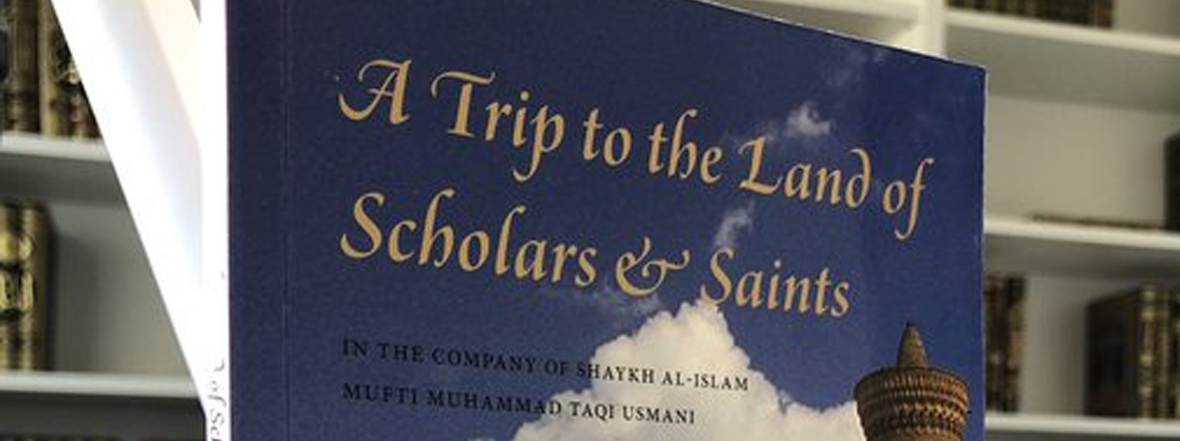Translated by Zameelur Rahman
Translator’s note: The following is the translation of an Arabic speech delivered by ‘Allamah Anwar Shah al-Kashmiri when Shaykh Rashid Rida visited Dar al-‘Ulum Deoband in 1912 CE. He explained the historical and intellectual background to the seminary and the school’s methodology in hadith-commentary.
All praise to Allah and He suffices. Peace be upon His chosen bondsmen.
This humble servant offers the greeting of Islam before this esteemed audience. Allah – Exalted is He – preserve you. We have sensed from you signs of nobility and interest in our condition. We feel an Islamic uprising turning towards us and you, and indeed we are needier of you than you are of us.
These are my teachers, my elders and my treasures before Allah in my day and my morrow. They asked me to extend gratitude to you for your generosity and for honouring us by your blessed presence. May Allah reward you and us, and elevate your ranks in religion, the worldly life and the afterlife. O Allah, accept! From Him we seek assistance.
Mawlana! Our story is a mixed story, and one part leads to the memory of another part. These lands of ours are a long distance away from the lands of Islam like Iraq, Sham and Egypt, so the symbols of Islam here are weak and the lighthouses of knowledge are hidden, except what Allah wills and who He wills, and these are few.
This group of ours is a group walking along an ancient path, not a new one. Our chain in religion is connected to the great fountainhead, the luminous moon, the famous imam, the great Shaykh Waliullah ibn ‘Abd al-Rahim al-Faruqi al-Dahlawi. The condition of the shaykh is more manifest than needs mentioning, for his writings have spread to the east and the west. However, some of the conditions of the shaykh need verbal retelling as do events I have received from our mashayikh.
From the conditions of the shaykh was that he had initially excelled in the religious sciences and their principles under his father, the great scholar, the erudite Shaykh ‘Abd al-Rahim. Then he travelled to the two Harams – Allah increase them in honour and nobility – and he benefited from their scholars and their jurists. He accompanied Shaykh Abu Tahir al-Kurdi in pursuing hadith and he exerted himself therein until he became accomplished in the subject. Shaykh Abu Tahir would say: “He learnt the words from us and we learnt the meaning from him.” He meant thereby clarification of the parts of hadith that require attention and specifying the intent of the lawgiver.
Then Shaykh Waliullah returned to his lands and he became occupied with amending what the people had corrupted from the Sunnah of the Noble Prophet – Allah bless him and grant him peace. Allah placed in his heart a light by which he could see the consequences of affairs, and he foresaw the coming of a battle between truth and falsehood, so he – Allah have mercy on him – began preparations to defend the religion. From that which he prepared for this [coming battle] is that he translated the Mighty Qur’an in the Persian language and he called it Fath al-Rahman. He shed it completely of Israelite accounts. By this he attempted to lay the foundations of Tawhid.
Then he commented on the Muwatta’ and he called it Al-Musawwa. [He commented on it] in the manner of the juristic scholars of hadith by verifying legal causes, selecting them and extracting them. By these are meant what is in the nomenclature of the scholars of Usul:
“Verifying a legal cause” (tahqiq al-manat) is that a ruling is issued from the lawgiver in a particular form, then that is established and is realised in all of the particulars of the type of that form. An example of this is evaluating the compensation for hunting [in the Haram during Hajj or ‘Umrah] so the price is recognised in a specific case. This is “verifying legal causes.” This is not analogy (qiyas), which is why the specific and the general are common to it, and it does not require ijtihad.
“Selecting a legal cause” (tanqih al-manat) is that a ruling is issued from the lawgiver in a form where different matters come together, and some of those things concur with the legal cause of that ruling and some of them have no bearing on it. So identifying the matter which is the legal cause is “selecting a legal cause.” An example of this is the hadith from Abu Hurayrah – Allah be pleased with him – he said: “A man came to the Prophet – Allah bless him and grant him peace – and said ‘I have perished!’ He said ‘What is your problem?’ He said: ‘I had intercourse with my wife during Ramadan.’ He said: ‘Can you free a slave?’ He said: ‘No’ He said: ‘Can you fast two consecutive months?’ He said: ‘No’ He said: ‘Can you feed sixty poor people?’ He said: ‘No’ – to the end of the hadith.” Abu Hanifah and Malik selected the legal cause of that ruling – the obligation of atonement (kaffarah) – as the act being a breaker of the fast, whether intercourse as in this scenario or eating and drinking intentionally. Thus, it being intercourse in this scenario is coincidental like all coincidents. Ahmad and Al-Shafi‘i opined that the legal cause was it being intercourse, so the ruling does not extend to eating and drinking. Another hadith is adduced as proof on the authority of Abu Hurayrah – Allah be pleased with him – he said: Allah’s Messenger – Allah bless him and grant him peace – said: “Whoever breaks the fast during a day of Ramadan without a dispensation offered by Allah, fasting a lifetime will not make up for it.” They understood it as eating and drinking intentionally and said “fasting a lifetime will not make up for it.”
“Extracting a legal cause” (takhrij al-manat) is that a ruling issued from the lawgiver in a form wherein a number of matters come together all of which are suited to be the legal cause, so the mujtahid selects a matter from those matters for the legal cause and makes that the legal cause. An example of it is the hadith prohibiting interest from the six things wherein a number of matters come together: quantity and type, foodstuff and price, and edibility and storability. Abu Hanifah opined that the legal cause of the ruling is the first quality [quantity and type], Al-Shafi‘i that it is the second [foodstuff and price], and Malik that it is the third [edibility and storability], in accordance with where their judgements led.
Hence, the difference between “selecting a legal cause” and “extracting it” is that in the first a number of matters come together which have no bearing on the legal cause, so the mujtahid selects the legal cause, and in the second a number of matters come together all of which are suited to be the legal cause, so the mujtahid prefers one of them to be the legal cause. “Selecting a legal cause” and “extracting it” are the tasks of a mujtahid, each of them rivalling the other.
Another example of this is the hadith: “The key to prayer is purification, its sanctification is glorification and its release is salutation.” The majority of the imams have opined that the wording of glorification [i.e. Allahu akbar] and the wording of salutation [i.e. al-salamu ‘alaykum] are integral, while Abu Hanifah extracted the legal cause from it as the first being any litany indicating glorification and the second being an exit [from prayer] by the [deliberate] action of the worshipper, and he opined that these two are obligatory (fard). However, the continuous practice of the Prophet – Allah bless him and grant him peace – has been established as the wording of glorification [i.e. Allahu akbar] and the wording of salutation [i.e. al-salamu ‘alaykum], so they ought to be obligatory (wajib), and Shaykh Ibn al-Humam has asserted that the wording of glorification is obligatory. The well-known opinion [in the Hanafi madhhab] is that it is an established practice (sunnah). In both of them [i.e. the wording of glorification and of salutation], a litany indicating glorification and an exit by the action of the worshipper are realised, like the realisation of a universal in a particular, so they ought to be obligatory (fard). There are many examples like this.
This is what Shaykh Waliullah attended to in the commentary of Al–Muwatta’. He also preferred therein a comprehensive jurisprudence. The shaykh also concluded in his book Al-Insaf fi Bayan Asbab al-Ikhtilaf and ‘Iqd al-Jid fi Masa’il al-Ijtihad wa al-Taqlid that the truth in the locus of ijtihad is multiple. He transmitted this from the four imams and preferred it. By “the locus of ijtihad” is meant where there is no [verse from] the Book or mass-transmitted Sunnah. So, the truth therein is multiple. Whenever there is a clear decider, that is not a “locus of ijtihad,” and the truth then is that which coincides with that clear decider, so whoever agrees with it has agreed with the truth and whoever opposes it has opposed the truth.
The shaykh – Allah Exalted is He have mercy on him – compiled many works on the system of legislation and true beliefs, which became a lamp and a standard for all who came after him. From them are: Hujjat Allah al-Balighah, Al-Budur al-Bazighah, Al-Tafhimat al-Ilahiyyah, Al-Khayr al-Kathirand others.
Then he was followed by his children and grandchildren. From his children were: the great shaykh, the perfect wellspring, Shaykh ‘Abd al-‘Aziz, then Shaykh Rafi‘ al-Din, then Shaykh ‘Abd al-Qadir.
Then Shaykh ‘Abd al-‘Aziz was succeeded by his grandson, the benefiter of the age and its transmitter famed in all regions, Shaykh Muhammad Ishaq, and his nephew, the reviver of the Sunnah, the magnificent scholar, Shaykh Muhammad Isma‘il. Shaykh ‘Abd al-‘Aziz would recite: “Praise be to Allah, Who has given me in old age Isma‘il and Ishaq” (Qur’an, 14:39). Allah benefited these lands through them. Shaykh Muhammad Ishaq studied Prophetic hadith and took to travelling long distances [in search of knowledge]. Shaykh Muhammad Isma‘il wrote books on the difference between Sunnah and dark innovation, so he revived the Sunnah when it was made to die, and he died a martyr – Allah have mercy on him.
The shaykh of our mashayikh, Shaykh ‘Abd al-Ghani studied under Shaykh Muhammad Ishaq. He became the pivot of transmission in his time, and he eventually migrated to the Pure City [i.e. Madinah] and became the transmitter of those lands and many people took from him there.
The sun of Islam and Muslims, the Gnostic, the hafiz, the verifier, Shaykh Muhammad Qasim al-Nanotwi, the founder of this glorious seminary, and the jurist, the hafiz, the mujtahid saint, Shaykh Rashid Ahmad studied under Shaykh ‘Abd al-Ghani. Shaykh Muhammad Qasim compiled books on the sciences and the realities and books in refutation of the opponents [of Islam] like the materialists, so Allah brought much benefit through him. I had composed these lines of poetry on his merit:
[The complete poem is not included in the transcript of the speech]When truth became mixed with falsehood, many questions were presented to Shaykh Rashid Ahmad so he answered them soundly. He was a mujtahid jurist. So we adopted that [i.e. Shaykh Muhammad Qasim] as an imam in the principles (usul), and this [i.e. Shaykh Rashid Ahmad] as an imam in the peripherals (furu’). A purified and select knowledge was extracted for us from them.
Then when foreigners took power over these lands [i.e. the British ruled India], a war took place between truth and falsehood, and Shaykh Muhammad Qasim founded this glorious seminary, and Allah benefited thereby many. Allah reward him the best of rewards. The end goal of the seminary is study and understanding of hadith. He believed that the foundations were necessities [and not end goals], and necessities are limited to the degree of necessity; such that Shaykh Rashid Ahmad proscribed philosophy and removed it for some years [from the curriculum] of this seminary.
This is our chain.
The path of our mashayikh in hadith and the understanding of hadith is an exemplary, balanced path, between extremes. I mean by this that the four imams each have an additional principle; that is, that Imam Malik follows the example of the practice of the inhabitants of Madinah, rather he prefers it over marfu‘ hadiths; and Al-Shafi‘i adopts the most authentic [hadith] in every chapter; and Ahmad adopts the most authentic, the authentic, the good and the weak when the weakness is slight, and he allows this and that [i.e. he allows acting according to all the hadiths], and based on this principle he compiled his Musnad; and Abu Hanifah takes these categories of hadiths and construes all the hadiths [on a subject] according to a common understanding, which is why interpretations are common with the Hanafis, and criticisms of narrators are common with the Shafi‘is. Al-Shafi‘i was the first to reject proof using mursal hadiths except when it is supported [by connected hadiths].
The imam of this science, the erudite Imam al-Bukhari – Allah have mercy on him – adopted the principle of Malik and Al-Shafi‘i – Allah have mercy on them – and rode amongst them, so he produced the most authentic of what is in the chapter and added support from the practice of the predecessors, which is why he did not produce a single hadith contradicting another hadith in his book. Hence with regards to the eclipse prayer he did not produce [any hadiths] besides the hadith of two bowings, basing this on his principle. Muslim – Allah have mercy on him – relied on the trustworthiness of the narrators so he produced the hadith of three bowings and the hadith of four bowings and even the hadith of five bowings halted (mawquf) at the Commander of the Faithful ‘Ali – Allah be pleased with him. Hence, Al-Bukhari was selective and Muslim was principled.
Our mashayikh took a middle ground in the like of this. They did not adopt extremism or laxity, and they explain conflicting hadiths using explanations which nearly all listeners will accept. An example of this is the hadith of two qullahs [a volumetric unit of measurement], for it was narrated by Yazid ibn Harun and Kamil ibn Talhah and Hadiyyah ibn Khalid and Ibrahim ibn al-Hajjaj from Hammad ibn Salamah, and these are firm memorisers and trustworthy narrators, with the wording: “When the water reaches two qullahs or three it does not carry filth.” They said regarding this hadith that it is not a legal limit for he said “two qullahs or three” indicating variety, so it is an estimation and is [in reality] a reference to purity from the traces of filth from one side [of a container] to the other side, and this is the rule in the madhhab of Abu Hanifah and his two companions as stated by Shaykh Ibn al-Humam and Shaykh Ibn Nujaym. The hadiths conflicting the hadith of two qullahs are secured [by this explanation], like the hadith prohibiting urinating in stagnant water, and the hadith prohibiting inserting the hand in a vessel when having woken up from sleep, and the hadith commanding washing a vessel which was licked by a dog.
Another example of this is the hadiths of recitation behind the imam, for when they adduced as proof for omitting recitation behind the imam in prayer His – Exalted is He – statement: “When the Qur’an is recited listen to it attentively and be silent that you may receive mercy,” and his – Allah bless him and grant him peace – statement: “When he recites, be silent,” and the hadith: “Whoever has an imam, the imam’s recitation is his recitation,” they interpreted the hadith “Don’t do [this i.e. recite behind the imam] except with the mother of the Qur’an [i.e. Surah al-Fatihah], for indeed there is no prayer for one who has not read it.” This interpretation was because there is no authentic narration about the circumstance for the revelation of the verse, so the consideration is upon the generality of the wording. Also, Al-Bayhaqi narrated in Kitab al-Qira’ati Khalf al-Imam from Imam Ahmad that the ‘ulama are agreed that this verse is about recitation in prayer.
And the hadith, “When he recites, be silent” is an authentic hadith, authenticated by Ahmad ibn Hanbal, then his companion Abu Bakr al-Athram, then Muslim in the chapter of tashahhud from the hadith of Abu Musa al-Ash‘ari, and he referred to it in the hadith of Abu Hurayrah, then Ibn Khuzaymah authenticated it, and Hafiz Abu Ja‘far ibn Jarir al-Tabari, and Hafiz Ibn ‘Abd al-Barr, and Hafiz Ibn Hazm al-Andalusi al-Zahiri, then Hafiz Zaki al-Din ‘Abd al-‘Azim al-Mundhiri, then the seal of the memorisers Hafiz Ibn Hajar al-‘Asqalani in Fath al-Bari. This is from the perspective of the chain. As for the practice of the predecessors and the imams, multitudes of the Sahabah acted upon it, as did Malik, Ahmad and Abu Hanifah. When the narrators of a hadith are trustworthy, and then supported by the practice of the predecessors, that is undoubtedly authentic, not harmed by any disapproval nor affected by any criticism.
The hadith, “Whoever has an imam, the imam’s recitation is his recitation” was related by Shaykh Ibn al-Humam from the Musnad of Ahmad ibn Mani‘ (160 – 244 H) and he authenticated it, for its chain is according to the criterion of the two shaykhs [Al-Bukhari and Muslim], and we have not till now come across any defect in it. Its chain is: Ishaq ibn Yusuf al-Azraq reported to us: Sufyan and Sharik narrated to us from Musa ibn Abi ‘A’ishah from ‘Abd Allah ibn Shaddad from Jabir ibn ‘Abd Allah he said: Allah’s Messenger – Allah bless him and grant him peace said – the hadith. It is supported by the mawqufhadith according to Al-Tirmidhi and the mursal according to others. Therefore, it is authentic. Thus, the explanation of the shaykh of our mashayikh Shaykh Rashid Ahmad of the hadith of ‘Ubadah through the route of Muhammad ibn Ishaq, the text of which is “Perhaps you recite behind your imam?” They said “Yes, O Messenger of Allah, we recite it quickly.” He said: “Don’t do [this]” – to the end of the hadith; he [i.e. Shaykh Rashid Ahmad] said this is proof of permissibility not proof of obligation. They would recite without a command from him – Allah bless him and grant him peace – which is why he asked “perhaps you recite behind your imam?” and when they said “yes” he said “don’t do [this] except the mother of the book” for it is a stipulated chapter from the rest of the Qur’an, apart from the chapters besides it. Hence, the Prophet – Allah bless him and grant him peace – justified its permissibility behind the imam its being stipulated from the chapters and there being no prayer without it. There being no prayer without it becomes manifest with respect to the imam and the individual worshipper (munfarid), and the effect of that is in terms of permissibility with respect to the follower (muqtadi). The issue of permissibility and undesirability is differed upon amongst the Hanafis, although they agree it is not obligatory.
They said in the issue of raising the hands and audible amin that raising and audibility have been authenticated from the Prophet – Allah bless him and grant him peace – and the Companions, and omitting raising and inaudibility have been authenticated, with an authentic chain for inaudibility in Abu Dawud, and omitting raising has been authenticated from the Commander of the Faithful ‘Umar and the Commander of the Faithful ‘Ali – Allah be pleased with them – and likewise inaudible amin has been authenticated from a group of the Companions and the pious predecessors. Hence, both matters ought to be sunnah, and only the matter of preference remains. This [being said], Allah gives accordance to what is right in the original abode and the return.
Our shaykh, the reliable proof, the transmitter of his age, Shaykh Mahmud al-Hasan – Allah benefit the Muslims by extending his life – studied under Shaykh Muhammad Qasim, and he is the shaykh of the seminary now, and upon him is the pivot of transmission in these lands. He follows the path of his mashayikh. Divine accordance helped him to reconcile between contradictions and to solve problems [in hadiths]. An example of this is what he said to me once that “The plurality of bowing in the eclipse prayer was established from the Prophet – Allah bless him and grant him peace – due to a circumstance specific to him, but he advised the community to make one bowing as he said, ‘Pray as the most recent prayer you prayed from the prescribed prayers.’” I revised the matter and I said, “The Shafi‘i masters consider the comparison to be for the number of cycles (rak‘at) not for one bowing” and he said that “This makes the self-evident (badihi) theoretical (nazari), for when the Prophet – Allah bless him and grant him peace – had prayed the eclipse prayer with multiple bowings himself before the eyes of the people and the heads of witnesses, were he to legislate multiple bowings for the community, why did he omit reference to what they witnessed and shifted it to comparison with the morning prayer? This is because the multiplicity of bowing was for a temporary reason, and he instructed the community with what is recognised in prayer.” Allah gives accordance and assistance. Our final call is that all praise belongs to Allah, Lord of the Worlds.
Nafhat al-‘Anbar, p.72-81






